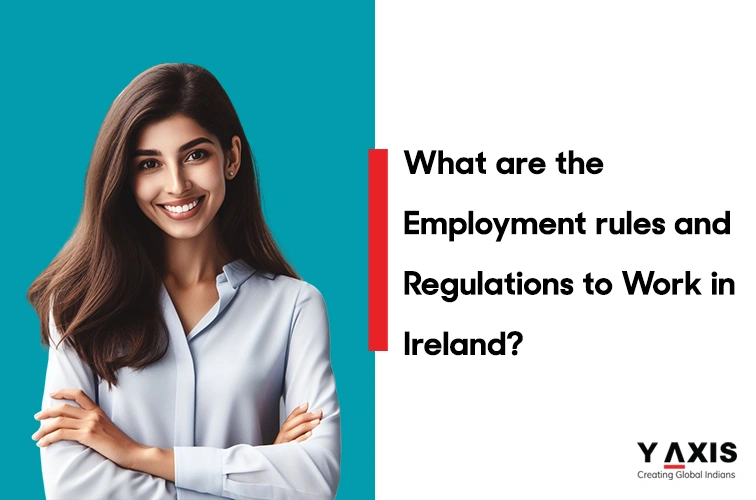Posted on July 31 2024
What are the employment rules and regulations to work in Ireland?
By , Editor
Updated July 31 2024
An employees working in Ireland have certain basic employment rights, which are set by the Irish employment legislature.
In recent years, Ireland has introduced new laws on minimum wage rates, working time regulations, and parental leave, making it an attractive place for talented employees to work and, consequently, a great place to run a business.
Irish Employment Law protects workers’ rights by ensuring employers provide fair pay, safe, healthy working environments, and freedom from discrimination or harassment. Workers may be entitled to compensation for workplace injuries and legal protection against unfair dismissal and other forms of discrimination.
*Want to work in Ireland? Talk to Y-Axis for complete guidance.
Employment rules and regulations to work in Ireland
Specific rules must be abided by the employee to work in Ireland:
Contract and terms of employment
The full-time employee will automatically receive the employment contract that will explain the job role. The whole-time contract will demonstrate the written statement of the core terms of employment within the first five days of starting a job. The employee must receive a statement of the remaining terms within one month of starting the work.
Working Week
The average working week in Ireland is set at a maximum of 48 hours. Most workers have the calculator over four months, although for night workers, it is just over two months. For employees in seasonable jobs with surges in activity, it is calculated over six months.
Breaks and rest periods
Employment laws also set out minimum rest periods. Ireland allows at least 11 consecutive hours away from work every 24 hours to ensure workers' mental health. Workers must also receive 24 hours off each week and 11 daily hours of rest.
During the workday, they are also entitled to a 15-minute break for every four and a half hours they work. If they work more than six hours, they are entitled to a 30-minute break including the first fifteen minute break.
Rates of pay
Most workers are entitled to a minimum wage of €12.70 per hour. Employees must receive payslips, which show their wages and any deductions.
Leave
Nearly all employees are entitled to annual leave and public holidays from the time they start working. Most employees are entitled to 4 weeks of paid annual leave for each leave year. Part-time workers mostly receive 8% of the hours if they work up to a maximum of 4 working weeks for each leave year.
The types of leaves that are allowed for the employees:
- Maternity leave
- Paternity leave
- Health and safety leave
- Parental leave
- Parent's leave
- Adoptive leave
- Carer's leave
- Sick leave
- Leave for medical care
- Force majeure leave
- Domestic violence leave
Termination of Employment
Employment law in Ireland states that the employer must be provided with a notice period before termination. The longer the employee has worked somewhere, the longer the notice period should be.
Here is the breakdown of the notice period:
|
Length of Service |
Notice Period |
|
13 weeks – less than two years |
One week |
|
Two years – less than five years |
Two weeks |
|
Five years – less than 10 years |
Four weeks |
|
10 years – less than 15 years |
Six weeks |
|
More than 15 years |
Eight Weeks |
*Looking for jobs in Ireland? Avail Y-Axis Job Search Services to find the right one for you!
Types of employment in Ireland
The Ireland labor law covers all private-sector employees, dependant workers, foreign nationals, and government employees. The employment law in Ireland has different types of employment in the country:
- Children or young person’s employment
- Fixed-term contract employees
- Part-time employees
- Self-employed contractors
- Agency Workers
*Want assistance for Overseas Immigration? Talk to Y-Axis, the world’s No. 1 overseas immigration consultancy for end-to-end support.
Tags:
Employment rules and regulations to work in Ireland
Work in Ireland
Ireland work visa
Work in Ireland
jobs in Ireland
Ireland immigration
migrate to Ireland
Ireland work permit
employment in Ireland
overseas immigration
work overseas
job
Share
Options for you by Y-Axis
Get it on your mobile
Get News alerts
Contact Y-Axis

